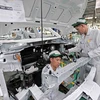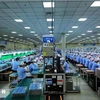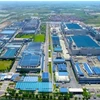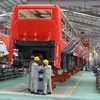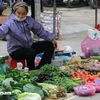Private enterprises have succeeded with their agricultural investments, but their progress still lags behind their true potential and the demand for development in the sector, a conference was told in Hanoi on June 28.
Minister of Agriculture and Rural Development Cao Duc Phat noted that investments by private businesses in the area had increased by 1.9 times from 2009-13.
The number of companies investing in agriculture rose from around 2,400 in 2007 to 3,635 in 2013, an average growth rate of 13.8 percent per year. Private firms accounted for nearly 90 percent of the figure, creating jobs for some 265,000 workers.
Companies such as Vinamilk, TH Truemilk, Minh Phu Seafood and property developer Hoang Anh Gia Lai have become locomotives driving high-tech application and market expansion in the agricultural sector in many localities.
Real estate giant Vingroup, major telecommunications service provider Viettel and multi-sector business group FLC have also expressed intentions to invest in the field.
The Government has issued specific resolutions last year and this year to speed up the improvement of the agricultural business environment.
The Ministry of Agriculture and Rural Development (MARD) has also established a working group with the participation of its management agencies and 30 key enterprises to attract agricultural investments.
Despite the aforementioned increases, Minister Phat said investments in agriculture remained limited and unstable. In 2014, businesses operating in this sector accounted for only about 1 percent of the total firms in the country, and more than half of them were of small scale with capital of less than 5 billion VND (238,100 USD).
Representatives of the World Bank and many companies said that better conditions related to land, infrastructure, taxes and fees, as well as investment promotions and technological development should be put in place in order to attract more interest in agriculture.
Deputy Prime Minister Hoang Trung Hai said challenges have become greater for agricultural development as the country will enter a variety of free trade agreements.
He said land issues, especially site clearance, is the biggest obstacle facing companies, and ministries and sectors will have to scrutinise them for appropriate settlements in the coming months.
He suggested enterprises should prioritise forming links with farmers instead of asking for land grants, since the growing Vietnamese population has left the per-capita area of land for production small.
Hai said the Government would focus its investments on agricultural infrastructure, including irrigational works and rural traffic, urging the MARD-led working group to concentrate on developing advantageous lines of products.
He urged enterprises to either team up or foster public-private partnerships.
The Deputy PM also urged agro-businesses to produce more quality products and pay more attention to the interests of the community in order to gain consumer confidence.
"The Government will continue to trim administrative procedures and show enterprises that we are serious about helping them to industrialise and mordernise agriculture and rural areas," he noted.-VNA
Minister of Agriculture and Rural Development Cao Duc Phat noted that investments by private businesses in the area had increased by 1.9 times from 2009-13.
The number of companies investing in agriculture rose from around 2,400 in 2007 to 3,635 in 2013, an average growth rate of 13.8 percent per year. Private firms accounted for nearly 90 percent of the figure, creating jobs for some 265,000 workers.
Companies such as Vinamilk, TH Truemilk, Minh Phu Seafood and property developer Hoang Anh Gia Lai have become locomotives driving high-tech application and market expansion in the agricultural sector in many localities.
Real estate giant Vingroup, major telecommunications service provider Viettel and multi-sector business group FLC have also expressed intentions to invest in the field.
The Government has issued specific resolutions last year and this year to speed up the improvement of the agricultural business environment.
The Ministry of Agriculture and Rural Development (MARD) has also established a working group with the participation of its management agencies and 30 key enterprises to attract agricultural investments.
Despite the aforementioned increases, Minister Phat said investments in agriculture remained limited and unstable. In 2014, businesses operating in this sector accounted for only about 1 percent of the total firms in the country, and more than half of them were of small scale with capital of less than 5 billion VND (238,100 USD).
Representatives of the World Bank and many companies said that better conditions related to land, infrastructure, taxes and fees, as well as investment promotions and technological development should be put in place in order to attract more interest in agriculture.
Deputy Prime Minister Hoang Trung Hai said challenges have become greater for agricultural development as the country will enter a variety of free trade agreements.
He said land issues, especially site clearance, is the biggest obstacle facing companies, and ministries and sectors will have to scrutinise them for appropriate settlements in the coming months.
He suggested enterprises should prioritise forming links with farmers instead of asking for land grants, since the growing Vietnamese population has left the per-capita area of land for production small.
Hai said the Government would focus its investments on agricultural infrastructure, including irrigational works and rural traffic, urging the MARD-led working group to concentrate on developing advantageous lines of products.
He urged enterprises to either team up or foster public-private partnerships.
The Deputy PM also urged agro-businesses to produce more quality products and pay more attention to the interests of the community in order to gain consumer confidence.
"The Government will continue to trim administrative procedures and show enterprises that we are serious about helping them to industrialise and mordernise agriculture and rural areas," he noted.-VNA







